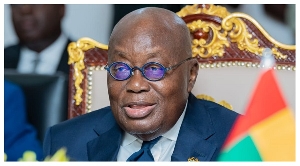Business News of Saturday, 6 April 2019
Source: goldstreetbusiness.com
Import community begins re-strategizing
A few days after Vice President Dr Mahamudu Bawumia announced that the benchmark values used by Ghana’s Customs and Excise Division to determine applicable import tariffs on various goods being brought into the country are being slashed by up to 50 percent, effective from April 4, 2019, the various operators and stakeholders in the importation process have already begun frenzied meetings and deliberations to re-strategize their cost structures and consequent pricing structures.
This is in response to what has the potential to generate dramatic changes in product prices for both imported and locally manufactured goods as the slash in benchmark values on imports is expected to directly translate into a commensurate reduction in applicable import duties even though the import tariff levels themselves will not change. Effectively, the new move amounts to a 50 percent reduction in tariff payment obligations on all imported goods – with the exception of vehicles which will experience a 30 percent reduction – without Ghana falling foul of the ECOWAS Common tariff structure introduced in 2017 and which is applicable by all member states of the West African regional body.
By yesterday, with the full potential effect of the new initiative sinking in among all stakeholders, hurried meetings of top executives in public sector institutions, private corporations as well as SME entrepreneurs were being organized to assess the implications on import costs, local manufacturing cost structures and product pricing.
Meetings were also being organized by port officials who now have a huge incentive to accelerate ongoing sea port expansion projects. In particular, Tema Port – which is currently undergoing a US$1.5 billion expansion programme, to triple its cargo handling capacity, under the auspices of Meridien Port Services, a consortium of three leading port operators and which is being supported by US$667 million in debt financing by the World Bank – stands to benefit from possibly as much as a doubling of the import cargo throughput which passes through it, much of this from dramatically increased transit trade. Ghana currently does about one million tonnes in transit import cargo to Mali, Burkina Faso and Niger, but volumes and value have dropped significantly in recent years as Ghana’s ports are no longer cost competitive against the ports at Lome, Togo and Abidjan, Cote d’Ivoire.
However, Ghana, aside from its impending import tariff payments reductions, is now about to introduce a range of port charge reductions in a bid to regain its competitiveness.
Freight forwarders and other operators in the imports logistics chain have begun strategizing as to how to secure as much of the impending new increased business volumes as possible. Again, they are already targeting the transit trade where much of the increased business volumes will be generated.
For other stakeholders, however, yesterday’s meetings – and those that will follow today – are establishing the sheer complexity of the impending new situation.
Local manufacturers are looking at how a possible halving of the duties payable on their imported inputs will affect their cash flows and their overall production costs and to what extent they could lower their product prices when the new imports valuation regime commences. At the same time they need to consider the cost competitiveness of their locally sourced inputs as the imported alternatives become significantly cheaper. A third consideration facing them is the threat to their domestic markets from competing imported finished goods, which will also become significantly cheaper.
Instructively though, local manufacturers that do not require imported production inputs are having to contend with impending weakening of their cost and product price competitiveness against imported final product alternatives and even competing local manufacturers that are using imported inputs rather than locally sourced alternatives.
Other meetings are being held by importers, under the Ghana Union of Traders Associations (GUTA) and its member associations, where members are putting heads together on how much of their expected import duty savings they should seek to retain and how much they should offer consumers in the form of product price cuts.
Interestingly though, Goldstreet Business learnt yesterday that government is counting on them seeking to reap wider profit margins from the impending tariff payment cuts, since this would retain the price competitiveness of locally produced alternatives; the biggest immediate worry for economists is that the coming tariff payment reductions will strengthen the price competitiveness of imported goods as compared against their local substitutes.
Going by the immediate reaction of various stakeholders following the Vice President’s announcement on Tuesday, the flurry of meetings and deliberations to intensify over the coming days.













